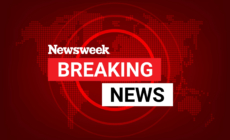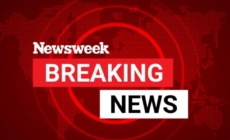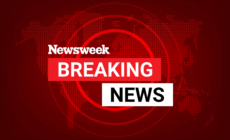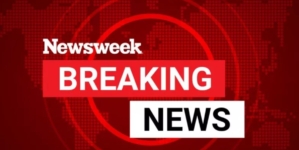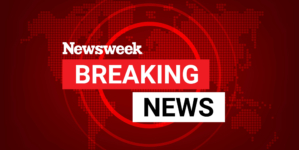-
Trump Faces ‘Vigorous’ Retaliation Beyond Tariffs on Goods—France’s Lombard - 16 mins ago
-
Australia’s Relationship with United States Gets a Second Look - 17 mins ago
-
Donald Trump Reveals $5m Visa Gold Card With His Face On - 50 mins ago
-
U.S. Strikes in Yemen Burning Through Munitions With Limited Success - about 1 hour ago
-
Donald Trump Issues Update on Elon Musk Leaving DOGE - about 1 hour ago
-
Stocks Fall Further as Concern About Tariffs Deepens - 2 hours ago
-
New York Giants, Cleveland Browns Trade Up for Quarterbacks in Latest NFL Mock Draft - 2 hours ago
-
Opinion | Trump Claims a Venezuelan Gang Is Invading the United States. He’s Wrong. - 2 hours ago
-
NSA Director and Deputy Reportedly Dismissed: What We Know - 3 hours ago
-
Ford Is Now Offering Buyers Its Employee Pricing Amid Trump Tariffs - 3 hours ago
Mark Carney Joins World Leaders Attacking Trump’s Tariffs: ‘Going To Fight’
Canadian Prime Minister Mark Carney joined a chorus of world leaders condemning President Donald Trump’s sweeping new tariffs announced on Wednesday.
“We are going to fight these tariffs with countermeasures. We are going to protect our workers and we are going to build the strongest economy in the G7,” Carney said in a video posted on X, formerly Twitter.
“In a crisis, it’s important to come together and it’s essential to act with purpose and with force and that’s what we will do.”
Newsweek has contacted Carney’s office for comment outside of normal working hours.

Adrian Wyld/The Canadian Press via AP
Why It Matters
Trump’s tariff announcement marks a dramatic escalation in his approach to global trade, and markets around the world have reacted swiftly to the announcement. European stocks have seen declines and Asian exporters are bracing for economic headwinds.
Critics argue that the policy could unravel decades of international trade agreements. The White House says it is meant to pursue “reciprocity to rebuild the economy and restore national and economic security.”
The move has also intensified fears of a new era of global protectionism and increased costs for businesses and consumers.
What To Know
On Wednesday, Carney told reporters: “President Trump has just announced a series of measures that are going to fundamentally change the international trading system. We are going to fight these tariffs with countermeasures.”
His statement followed Trump’s announcement in the White House Rose Garden that a 10 percent baseline tariff would be applied to imports from almost all of the U.S.’s trade partners from midnight on Friday.
On top of the blanket 10 percent tariff, Trump announced country-specific reciprocal tariffs.
Branding April 2 “Liberation Day,” Trump framed the policy as a necessary response to what he called unfair trade practices.
The White House said the goal is to shrink the U.S.’s $1.2 trillion trade imbalance recorded in 2024.
“Reciprocal trade is America First trade because it increases our competitive edge, protects our sovereignty, and strengthens our national and economic security,” the White House said in a statement.
The list of reciprocal tariffs includes these:
- European Union: 20 percent
- United Kingdom: 10 percent
What People Are Saying
Trump’s tariffs drew sharp criticism from leaders around the world. Here is what some of them had to say:
Irish Prime Minister Micheal Martin said, according to Sky News: “We see no justification for this. More than €4.2bn worth of goods and services are traded between the E.U. and the U.S. daily… Tariffs drive inflation, hurt people on both sides of the Atlantic, and put jobs at risk.”
Thailand’s Prime Minister Paetongtarn Shinawatra said, according to Al Jazeera: “We have to negotiate and get into details. We can’t let it get to where we miss our GDP target.”
South Korean Acting President Han Duck-soo said: “As the situation is very grave with the approach of the reality of a global tariff war, the government must pour out all of its capabilities at its disposal to overcome this trade crisis.”
Japan’s trade minister Yoji Muto called the tariffs “extremely regrettable.” He added: “We need to decide what is best for Japan, and most effective, in a careful but bold and speedy manner.”
Australia Prime Minister Anthony Albanese said: “This is not the act of a friend. The (Trump) administration’s tariffs have no basis in logic and they go against the basis of our two nations’ partnership.”
Norwegian Prime Minister Jonas Gahr Stoere told the public broadcaster NRK: “This is bad news, it is very serious. There is an opening for negotiations here, the Americans say, and we will use that in every possible way that we can.”
New Zealand Trade Minister Todd McClay said: “We won’t be looking to retaliate—that would put up prices on New Zealand consumers, and it would be inflationary.”
Colombia President Gustavo Petro wrote on X: “Today, neoliberalism, which proclaimed a free trade policy across the globe, is dead… The U.S. government now believes that by raising tariffs on its imports in general, it can increase its own production, wealth, and employment; in my opinion, this may be a big mistake.”
What Happens Next
Implementation of Trump’s new tariffs is set to unfold in stages over the coming days. A 25 percent tariff on all foreign-made automobiles is set to take effect on April 3. This will be followed by the introduction of a 10 percent baseline tariff on all imported goods beginning April 5.
The broader slate of reciprocal tariffs, targeting more than 60 countries, will officially be enforced starting April 9.
Source link


